TEA WITH woldy reyes
a conversation on business, alcohol, tea, kombucha, non-alcoholic drinks AND SO ON.
I spoke with one of my favorite New Yorkers, chef and fashion sweetheart, Woldy Reyes (working under the moniker Woldy Kusina). I first met Woldy when I covered a communal Filipino dinner for Vogue. Woldy was cooking and I was blown away by the experience and by his kindness. Here’s us at at that dinner (photo by Fujio Mura)
A few months later, I wrote about him once more, a cover story for Edible Manhattan. This past summer, I invited Woldy over for tea at my apartment. More than an interview, it was a conversation. I also took a couple of few photos :)
TEA WITH woldy reyes below <3 And watch the little video above!
[We took first sips of our tea. I don’t remember what I made now. It was a mix of one of our herbal blends with some fresh herbs I got from the market the day before. And I also made iced tea.]
Woldy (W) It’s subtle and floral.
Maria (M) Wow I’m actually really pleased with this.
W It’s divine, it’s beautiful, wow!
Cheers!
W How old is your daughter?
M Two and a half.
W What’s her name?
M Mona. She’s a sweetie. So Sage used to babysit her, but then I really needed help with Masha Tea so now, long story short, Sage now works for Masha Tea.
W When did you get a point where you needed additional support? Because you also write, and writing is also a lot of work in addition to running a business. When do you get to a point when you realize you need additional support?
M I actually got there kind of early, before [writing professionally] I had a naturopathic medical practice which was very time consuming, and I couldn't do everything myself. And I would do the farmers markets with Masha Tea so I needed another person. And then I got used to having a second person and asking for help. And I, knock on wood, have gotten pretty lucky with the people that I work with.
W I’m getting to that point.
M Well don’t you have people cook with you?
W For sure - it’s freelancers and only If they’re available. 90% of the time they say yes and you know, but then I have pop-ups or events, then I have to find people and then another part of this is sourcing ingredients. And then the other part is figuring out where I am going to be cooking. So if it’s an offsite thing, I have to figure out what commercial kitchen is available. There’s so many layers. And I’m like a one man show.
M I get that, because I most of the time, I am too. But can you can get someone part time for a few hours a week who knows what they’re doing.
W I like when someone has an opinion and doesn’t always agree with what I’m saying.
M I feel like Sage and I have this thing, where I’m like, “I have an idea!” And Sage is like “NO.”
Sage (S) - It’s more like, “how do we not make it so extreme?”
W How long have you been working together?
S Like a year
W And then also you have a two year old which is kind of like, how do you do it all?
M Well, I just get stressed. Haha.
How long have you been cooking for?
W Since 2016. I think I mentioned this before but I made a career switch. Right before I decided to start my own catering company, I was working in fashion and that’s why I’m so engrained in the fashion community and in fashion opportunities. Because of interning at Owl and working at Nylon and friends who I’d interned with are now working in PR or design houses and they always seem to be looking for a chef to create an immersive culinary experience and I’m there.
M That’s a great deal. We talk about doing more synchronistic events with fashion too, like around fashion weeks. It seems like events are often more centered around food.
W You know, food and beverage are really different experiences. You want it to complement the food. You know, when I was starting to cater, I wanted to have kombucha and nobody was having kombucha at events. I was like “Yea, it’s an alternative to Pepsi, cola, but kombucha is good for your diet and you want to shit afterwards and have a release.” I like anything fermented that is better for your stomach.
M Do you make kombucha?
W No, I haven’t have you?
M I’ve made it before.
W Do you have a scoby?
M I got rid of it. I just don’t like it enough to keep it going.
W Is it because it’s very science-y?
M No, I just don’t want to drink THAT much kombucha. Like I’m down to drink kombucha every once in a while, but the amount of effort that it takes to keep it alive, I’m not here for. It also gets disgusting if you don’t take care of it. Like it grows layers. Which is what happened to mine.
W Well sometimes you wonder, with all these kombucha brands, is it actually fermented and is there a good quality to it, because I feel like there are certain kombuchas where I feel like I can feel [the effects] and then are there are those bodega brands..
M I guess I did go through a phase of drinking a lot of kombucha and I would always get the one with chia seeds in it because I love that texture.
W And with the chia it makes you satiated, and have a bowel movement. Anything to have a number 2 in the equation. You need to release.
M For sure.
W So - have you had [Masha] tea fermented into kombucha?
M No actually! I was making kombucha before I started Masha Tea. It would be a good partnership!
W With the one brand that’s really cool with simple branding.
M In the wine bottle?
W Yea!
[We talked a little about a bunch of non alcohol brands, removing the gossip for this interview, sorry!]
M That’s so interesting because I’m so averse to non-alcoholic drinks that are not either plain seltzer or iced tea. I don’t know why .. I just have like this mental block around them. You know sometimes you go to a party and they’re serving [x] and I just don’t want it. Like I don’t want to replace alcohol. I just want to drink something that I want to be drinking anyways. But I guess if it does make you feel something..
W Yea, I’m minimizing my drinking because I want to feel good the next day.
M I can’t drink that much anymore either. And I actually miss feeling a little bit drunk, but I just get a migraine the next day so I can’t really do it.
W There’s that moment when you are actually drinking in that moment and you feel happy. Drinking affects people’s body and minds differently. For me, I’m just having fun.
M For me, I often start getting a headache while I’m still drinking. There are some times when I can share a bottle of wine with friends and it’s totally fine, but not always. And it’s a bummer because I Love wine and I actually want to be able to drink more than my body is allowing.
W I’m sure you have a couple of glasses every once in a while.
M Yea, I mean I do drink there’s just always this back and forth of am I not going to feel good?
W There’s such a popularity in non-alcohol beverages.
M Have you seen that with tea at all? Because I feel like tea hasn’t filled that gap yet for some reason, because it feels like a different thing.
W I mean kombucha is tea, so you’re drinking fermented tea, but tea in general, I think about the popularity of boba milk tea.
M But boba is not usually to pair with food. An example - I did a pop up with a chef [Pierce Abernathy] and a baker [Paris Starn] last fall and we paired all of the courses with tea. We did hot tea and it worked well, but you don’t really see people doing it that much. We had two main courses and a dessert.
W And people really enjoyed it?
M Yea! It’s interesting because like how you were saying earlier, food and beverage are two different experiences. But there are tea rituals across cultures that are independent of food. Where tea comes first, and food comes second or as a snack. And the experience can still last for hours. And I feel like that isn’t the case with most drinks. I guess coffee.
W Coffee is so ingrained in our culture. Especially in New York City. Well my experience with tea is with my family in Southern California, the first thing that’s served is tea in a white pot and then you drink that and that starts to open your stomach a bit. And then I think that’s so ingrained in my memory is that the first thing you have is tea and then all of those delicious dishes that come afterwards. And you then end with tea. I think because of the eastern way, my experience growing up in Southern California, that’s what I saw.
M Did you guys drink tea at home?
W No, not really.
M We drank So much tea at home.
W Like what kind?
M Black tea, always black tea.
W Like Lipton black tea?
M No, we never had Lipton. They would get this kind .. well we either had Twinings or this brand Ahmed. Or at the Russian store there’s this brand Czar Nicholas II which I loved .. the packaging was so nice. It was just loose black tea from India or Sri Lanka and sometimes they would make that. But we would have black tea at least twice a day.
W Are you British?
M It’s part of Eastern European culture.
W Oh right, you’re Ukrainian!
M Yea, I’ll show you I have a bunch of my grandparent’s teaware that they brought when they immigrated.
W Is it like antique brass?
M I think it’s porcelain.
W I’m curious what’s the difference between how warm water reacts to porcelain versus mental.
M Well porcelain is ceramic.. I think that most traditional tea ware is ceramic vs metal. I have some metal pieces from my family too but I think they’re more ornate versus functional. And also metal isn’t good for tea because it loses heat immediately and the piece itself feels really hot. Like this one, I brought this home from Italy for Mona.
W Beautiful!
M But she’ll just use it as a toy.
W That’s gorg!
M It’s enamel. I was going to sell it because you know I sell vintage tea ware but Mona saw it and loved it so I saved it for her.
W I love a little spout! It reminds me of a Disney movie, Beauty and the Beast. That’s another memory associated with drinking tea. The little saucer drinking tea.
M I feel like people either have either strong memories from childhood, otherwise it’s childrens pop culture references.
W But I think when I started to source for catering, being more intentional of what I wanted to source [I got into loose teas]
M That’s part of why, with Masha, we’re thinking a lot more about having a physical space, a tea shop
W To immerse people in.
M Yea, so that people can have an experience, versus thinking of tea [and the Masha universe] as an abstract concept. We have an online shop obviously but because we largely wholesale, it’s in places that want to have really high quality tea so they have Masha, but it’s their visuals and their stuff, versus our visuals and our understanding of how to drink tea. So we’ll see what happens.
This interview has been edited FOR YOUR READING PLEASURE! If you love reading TEA WITH, please

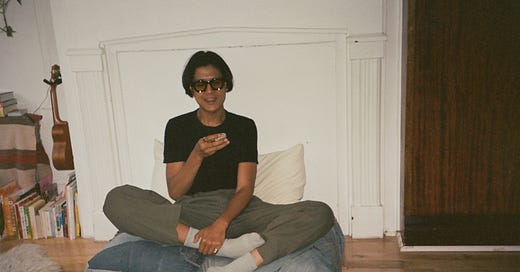


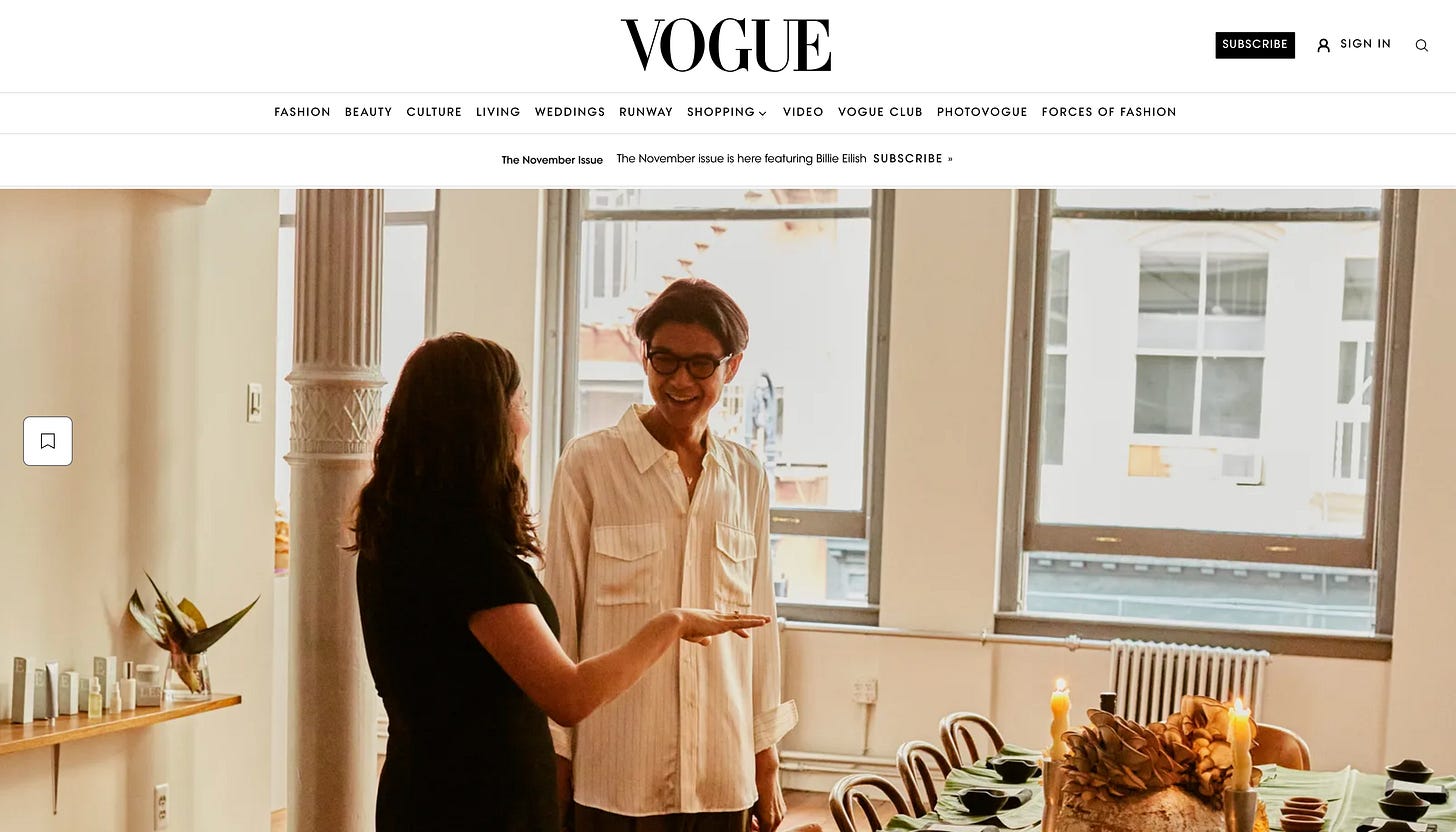

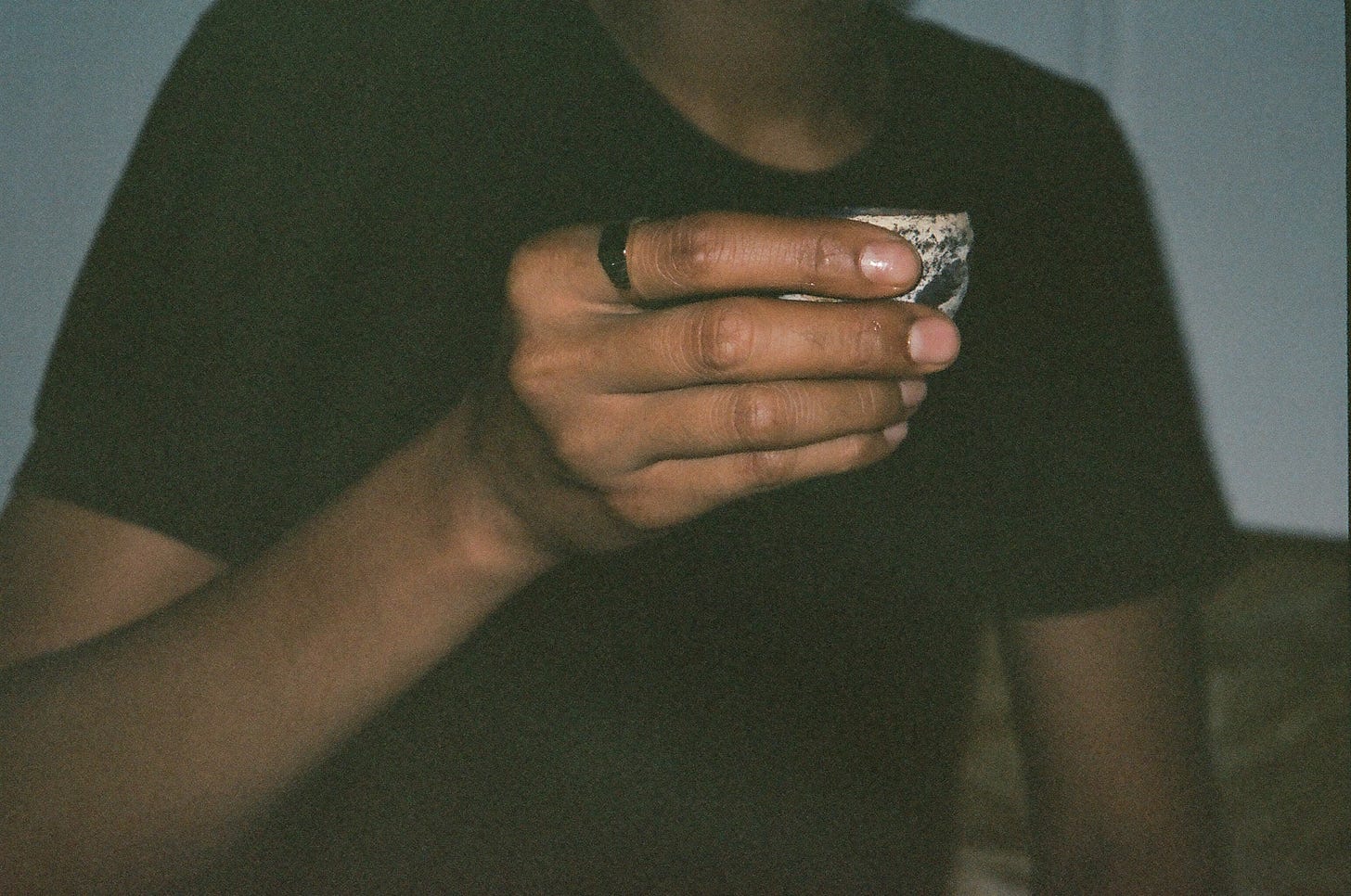
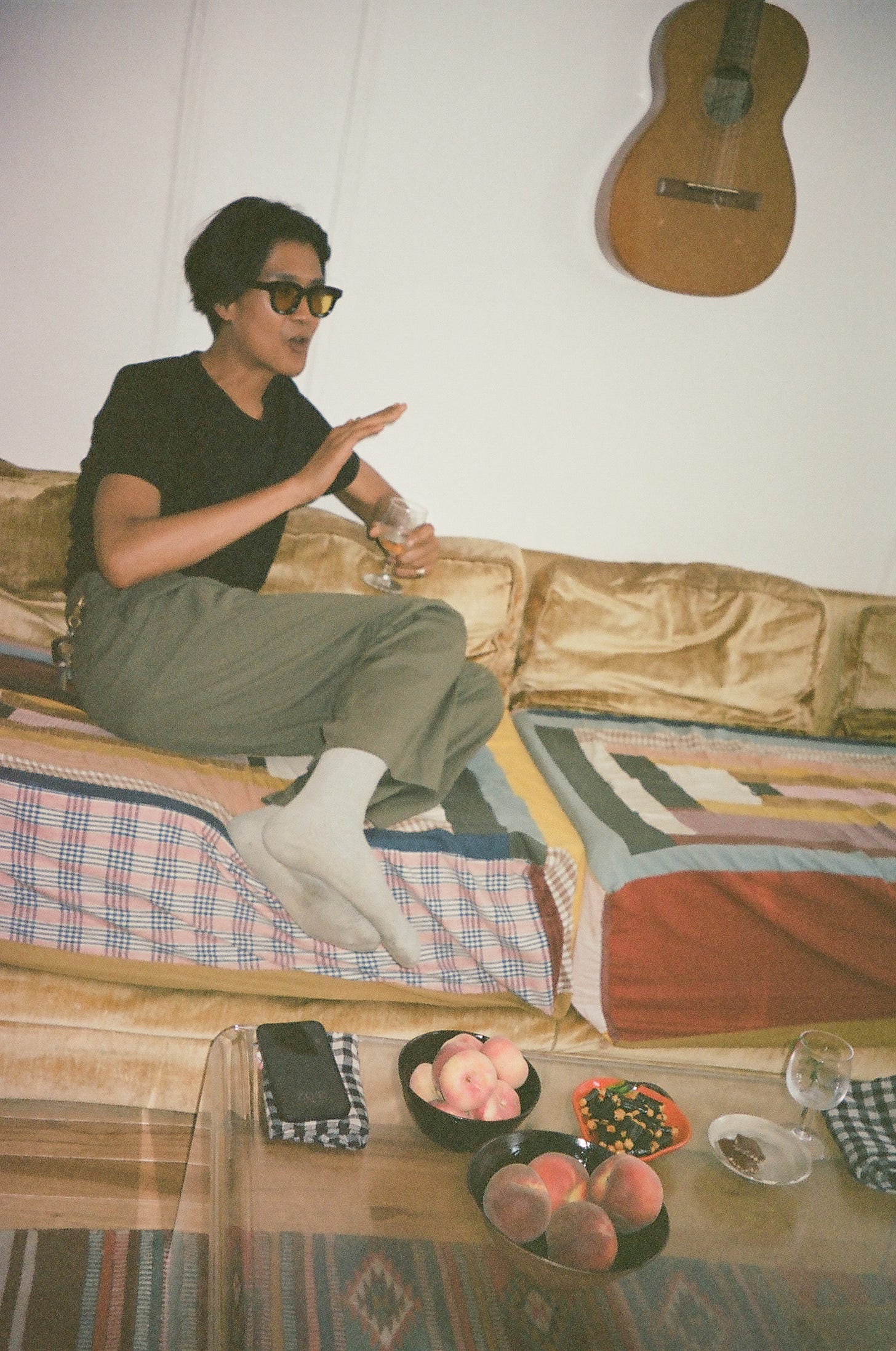
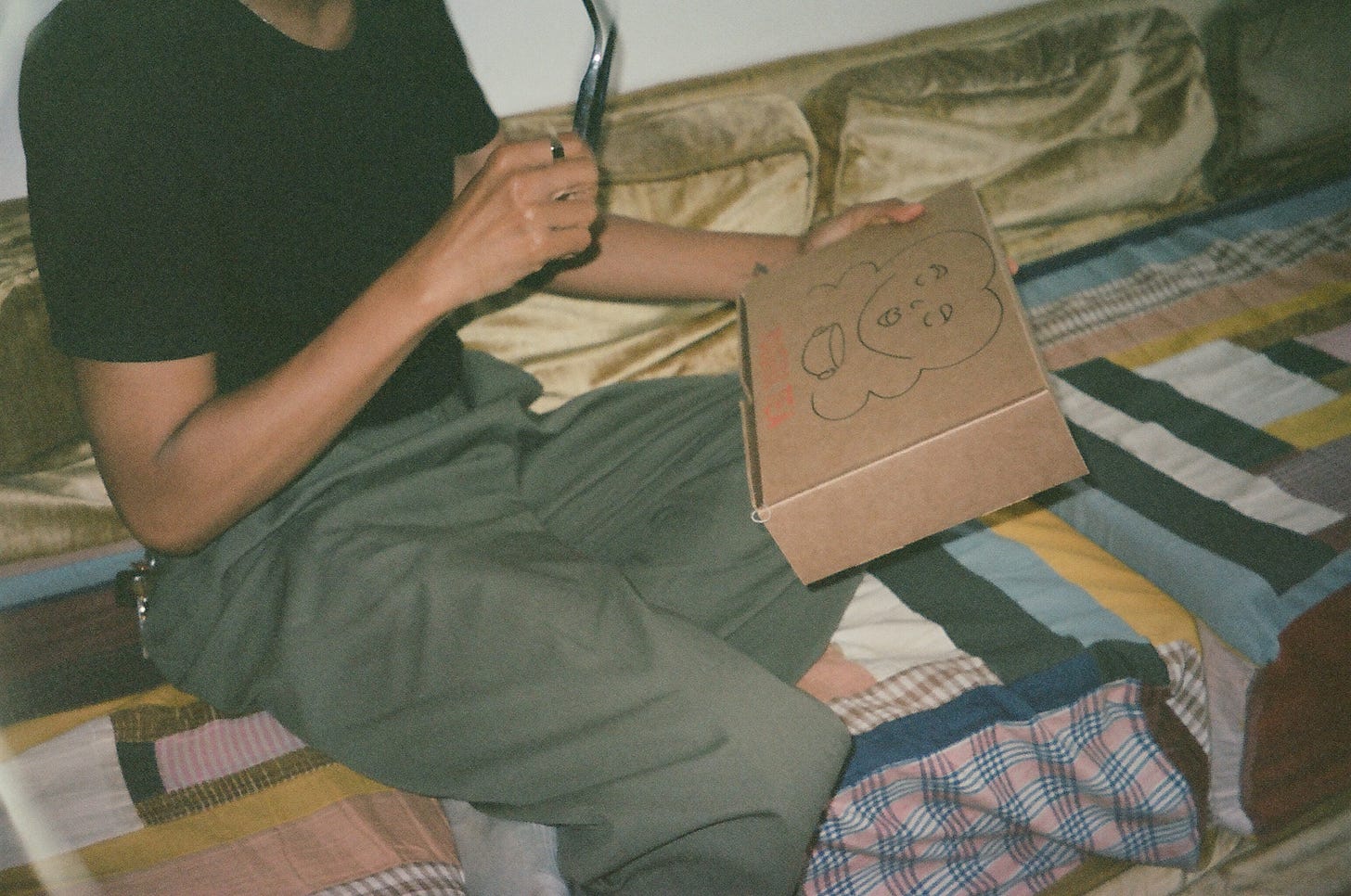
Loved this chat between you two!!!!